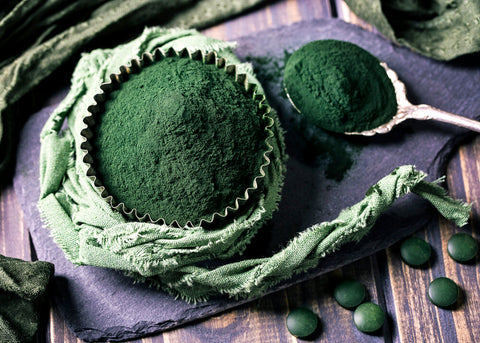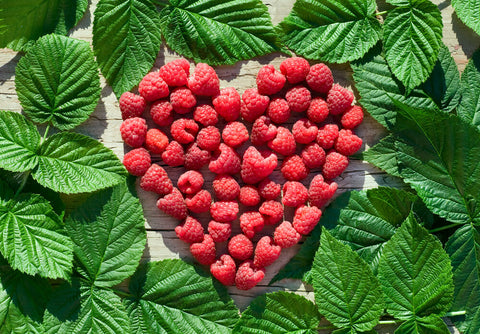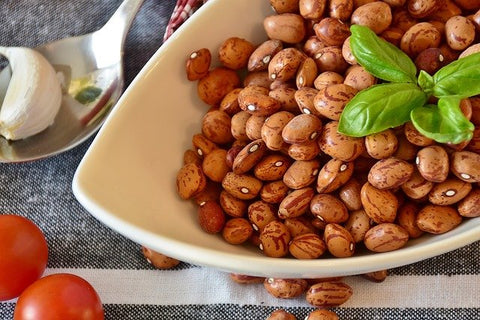10+ Plants & Herbs Rich in Iron for Anemia Support
Anemia is a condition in which your body doesn't have enough red blood cells to carry oxygen to all your organs and tissues. As a result, you experience fatigue and possibly other symptoms like weakness, pale skin, dizziness, or shortness of breath.
The most common cause of anemia is iron deficiency. Iron is a key component of hemoglobin, the part of red blood cells that carries oxygen, and your body can't make enough red blood cells without it.
There are other possible causes of anemia, including a vitamin B12 or folic acid deficiency, but this post focuses on how to replenish your iron supply through plants.
As always, be sure to see a qualified healthcare practitioner if you are experiencing severe anemia or health problems.
Common Treatment Options for Anemia
If you've been diagnosed with iron-deficiency anemia, the most commonly recommended treatment is an iron supplement and/or adding more iron into your diet.
For some, anemia stems from an underlying disease that must be treated before the anemia itself will resolve.
Iron supplements are the quickest way to correct an iron deficiency, but they do come with side effects like digestive upset, nausea, and constipation. They can also put you at risk for getting too much iron, which is toxic for your body.
For those with milder forms of anemia or those wanting to prevent it, adding more iron into your diet may be enough. Meat (particularly red meat and shellfish) are the top iron sources, but not everyone wants to opt for animal-based products.
The good news is there are many great plant-based sources of iron, including herbs and other plant foods. Herbs, especially, have been used for centuries to supply the human body with iron and numerous other nutrients.
Herbs Rich in Iron for Anemia Support
Yellow Dock

Yellow dock is one of the most commonly used herbs for an "iron tonic". Both the leaves and the roots are edible and used in herbal medicine, but it's the roots that contain most of the iron.
Yellow dock root also supports your digestion and liver and is considered to be a blood purifier. Because the root is on the bitter side, most people prefer to take it blended with more pleasant herbs (like citrus peel or mint) or as a syrup.
Nettle
Nettle leaf is rich in multiple vitamins and minerals. Not only is it a good source of easily assimilated iron, it also contains vitamin A, vitamin C, magnesium, calcium, and potassium as well as antioxidants.
Because of this nettle is a top herb used during pregnancy (including for iron deficiency in pregnancy) and at other times when the body needs a nutrient boost. Use the leaves to make a strong nutrient-rich infusion or steam and eat the fresh greens. (Just never eat raw stinging nettle!)
Dandelion
Dandelion is often viewed as a common weed (much like yellow dock), but the entire plant is a rich sources of nutrients and potent compounds. Both the leaves and the root are rich in iron and help to cleanse your liver and blood.
Dandelion is on the bitter side, but many people enjoy its coffee-like flavor. To make it even more of a coffee substitute, roast the roots and combine with roasted chicory root in a 1:1 ratio.
Moringa
Moringa leaves could well be considered a superfood because of all the nutrients they contain. In fact, the leaves are a richer source of iron than beef or spinach and are also packed full of vitamin C, vitamin A, calcium, potassium, protein, and antioxidants. (1)
To get the most iron, use powdered moringa leaf rather than the whole leaf and add to smoothies, juice, etc. Moringa does has a distinct flavor, so you may want to disguise it in something, but it is incredibly nutritious.
Spirulina and Chlorella

Spirulina and chlorella are different types of green algae that have great potential as herbs for anemia support.
Spirulina, in particular, is one of the most nutrient-dense foods on earth, and just one tablespoon contains 11% of the daily value (DV) for iron. Chlorella contains even more iron than spirulina and has great detoxifying properties.
To take either one of these herbs rich in iron, simply add them in powdered form to smoothies, food, etc. or try them as tablets. Here's a highly quality spirulina powder to try.
Alfalfa
Alfalfa is another nutrient-dense herb that is particularly rich in iron and protein. It also contains good amounts of calcium, magnesium, phosphorus, vitamin A, vitamin K, chlorophyll, and antioxidants.
With this great nutrient profile, alfalfa is often used during pregnancy and postpartum to help replenish the body. You can add the fresh sprouts to all kinds of foods or use dried alfalfa leaf to make a strong infusion.
Parsley
Parsley is a familiar herb to many and deserves to be thought of as much more than a garnish. It is high in minerals like iron, magnesium, and potassium as well as vitamins C, A, and K.
For the most part, parsley is best consumed fresh because it doesn't dry well and quickly loses nutrients in storage. However, if you can't find the fresh version, steep the dried leaves in hot water for a few hours to make an infusion.
Burdock Root
Like dandelion and yellow dock root, burdock root is very rich in iron and considered to be a top herbal blood purifier. It helps to cleanse your liver and clear lymphatic congestion all while supplying your body with numerous nutrients.
Burdock root does have some bitterness but not as much as other roots. It can make a delicious tea when pair with spices like cinnamon or other herbs like sarsaparilla (for a root-beer-like tea).
Red Raspberry Leaf

Red raspberry leaf is a particularly wonderful herb for the female body because it provides support during PMS, pregnancy, postpartum, and all other stages of life. It can also be extremely helpful for anyone needing a nutrient boost because it is rich in iron as well as calcium, potassium, magnesium, and an array of vitamins.
Red raspberry leaf also happens to be delicious and easy to take as a tea or strong infusion. Pair it with other herbs rich in iron (like nettle or dandelion) for the most benefits.
Bonus Herb: Rosehips
Rosehips deserve a mention because, although they don't contain a significant amount of iron, they are incredibly rich in vitamin C.
Vitamin C is a very important nutrient for helping your body absorb the type of iron that is found in plants and herbs (nonheme iron). For that reason, you may want to consider adding rosehips to your herbal iron tonic to help your body absorb the maximum amount possible. (2)
How to Use Herbs for Anemia Support
Here's something important to know about using herbs rich in iron: If you aren't going to eat the herbs fresh/whole, the iron is best extracted in hot water preparations.
This means that tinctures are not the best choice if you want to get iron from herbs. Instead, you should opt for a strong tea or a syrup, which both make use of hot water.
In general, leaves should be prepared as an infusion (a really strong tea) and roots as a decoction. You can learn about how to make an herbal infusion and decoction here.
An herbal syrup is best for herbs that are very bitter (like yellow dock) or unpalatable. Plus, it just tastes good! You can learn about how to make an herbal syrup here.
If you can't decide which herbs to start with, try this Iron Tonic Tea that contains several of them. You can use the herbal tea blend to make either an infusion or a syrup.
Other Plant Foods Rich in Iron

Along with herbs, there are many other plant-based foods that are rich in iron. When possible, consume them alongside a food rich in vitamin C to boost iron absorption.
Here are some of the top choices:
- Lentils
- Chickpeas
- Spinach & other leafy greens
- Soybeans
- Seeds (pumpkin, chia, sesame, flax)
- Cocoa powder/dark chocolate
- Potatoes (with the skin on)
- Cashews & other nuts
- Beans
- Mushrooms
- Prunes & other dried fruits
- Oats
- Quinoa
- Whole grains
- Blackstrap molasses
Precautions
While the herbs listed here are generally safe, keep in mind that they may be contraindicated in certain situations, especially for certain health conditions or if you take certain medications.
When possible, consult with a qualified herbalist about your specific situation, and always do your research.
In addition, herbs and food are not a treatment for severe anemia. Be sure to visit your doctor as needed for serious health issues.
Using Plants and Herbs for Anemia Support
If you want to get more iron from plant-based sources, there are plenty of herbs and foods out there that will do the job. Be sure to consume herbs rich in iron regularly to fully benefit from them, enjoying them as a tea or syrup.
Disclaimer: This post is for informational purposes only. It does not constitute medical advice and should not be substituted for medical advice. Please consult your health care provider, herbalist, midwife, or naturopathic physician before taking herbs, supplements, etc. Here's the link to our full disclaimer.





Thank you so much for this fabulous information. It is simple to read and very informative. Is there anyplace online that one can check interaction of herbs and medicines or certain health issues and certain herbs?
Thank you so much!
Megan
Leave a comment